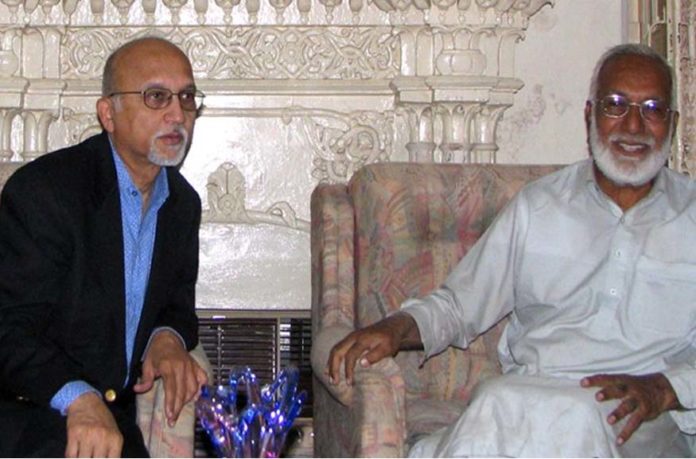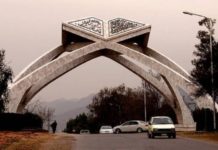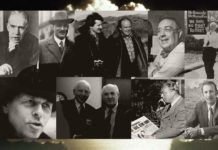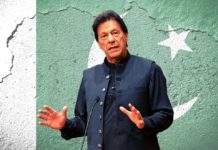Professor Vinay Kumar and I had been emailing each other for a long time. He was very eager to tell me his story about what happened to his family in Okara in 1947. On 3 February 2005, he visited the famous medical centre, the Karolinska Institute in Solna, a suburb of Stockholm, to attend a conference. We met in a Chinese restaurant in Stockholm and I recorded the following interview:
“I was born in December 1944 in Okara. My maternal grandfather, Dr Uttam Chand Ahuja was originally from Lahore. He was in the Punjab Civil Medical Service and served in several places in the Punjab. When he retired some 15 years before partition he decided to settle in Okara town, in Montgomery District, where he owned a large house. He took no payment from his patients. The compounder (medical technician) Harbans Lal had a box in which the patients could, if they wished to, put some money, but there was no fee. He was a very large-hearted and pious person who never discriminated against anyone on the basis of religion or caste. People would travel from 50 to 60 kilometres in the night and come to him asking him to accompany them to see their sick or pregnant wife or child. He would do so immediately, riding on his horse. The people would show their gratitude by sometimes bringing a cow or a horse or other animal and leave it as a gift.
“He was an integral part of that society. To have expelled him from there was like cutting his hand or leg off. He had two tongas. I remember he used to take me on tonga rides in the evenings. Although I was only a very small child I remember even now him asking me, ‘Which tree is that?’ I would reply, ‘Lalaji, It is a tali.’ Sometimes I would say, ‘I don’t know.’ One day my cousin who was a teenager at that time, took me to the grounds where he played volley ball. Somehow I got lost. People asked me who I was and where I lived. When I gave my grandfather’s name within minutes I was brought back because everyone knew Dr. Ahuja.
When the partition process started, the Hindus and Sikhs became anxious as they were a minority in Okara
“When the partition process started, the Hindus and Sikhs became anxious as they were a minority in Okara. When the trouble began the tahsildar and lambardar came to our house along with other important people. They said to my grandfather, ‘Doctor Sahib you are not to go from here. You are ours, don’t be afraid.’ Grandfather replied, ‘Of course. I belong here and have not even thought of leaving.’ But then the situation became worse as Muslim refugees began to pour into Okara. Then the same men came with tears in their eyes. They placed their turbans on the ground (a mark of respect) and said, ‘Doctor Sahib we are very ashamed, and we ask your forgiveness: we can’t protect you any longer. The people of Okara will not touch you, but we can’t restrain those thousands that have arrived from East Punjab. They have seen blood and cannot be controlled. However, we guarantee that we will escort you to the border safely.’ This is exactly what they did. They took him to the border and made sure that he crossed safely. Which month it was I don’t know, but it must have been either October or November.
“This shattered him. He settled in Khanna, in Ludhiana District, where he was given land, but he settled in Ludhiana city. He continued the same practice of never asking for any fee. Whatever people could give was accepted. He wore a kullay wali paggri (style of turban used mainly by Muslims) with a suit. All this I have heard from Lalaji, my father, and my mamaji (maternal uncle). My father was posted in Agra in 1947. He was in the army ordinance corps and was therefore not affected by the partition.”
In 2006, Prof Vinay Kumarn went to a conference of Pathologists in Lahore. There some people helped him to visit Okara and with the help of some locals he started looking for his grandfather’s house. After several hours he was about to give up when just at the last moment he recognized it after all those years. He was only two and half years old in 1947, but the house was still standing there as it had in 1947.
The Muslim family which had moved in was from Gurdaspur — also a family of doctors.
In 2017, I visited Okara along with Zakria Khan and Mahmood Rana Sahib and with the help of Rana Muhammad Azhar Khan who was related to the family which had moved into Dr Uttam Chand’s House we first visited the site where the old building existed. The front portion had been demolished and several medicine shops have come up on the main road. On the side road some portions of the old building still exist.
Afterwards we visited the family in the new residence in Green Town Okara. Sarmad Sahib, the elder son of the doctor Sahib from Gurdaspur, met us very warmly.
About the Author:
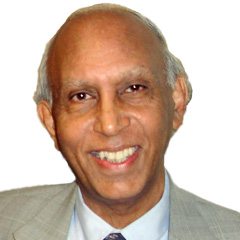
Dr. Ishtiaq Ahmed is Professor Emeritus of Political Science, Stockholm University; Visiting Professor Government College University and Honorary Senior Fellow, Institute of South Asian Studies, National



